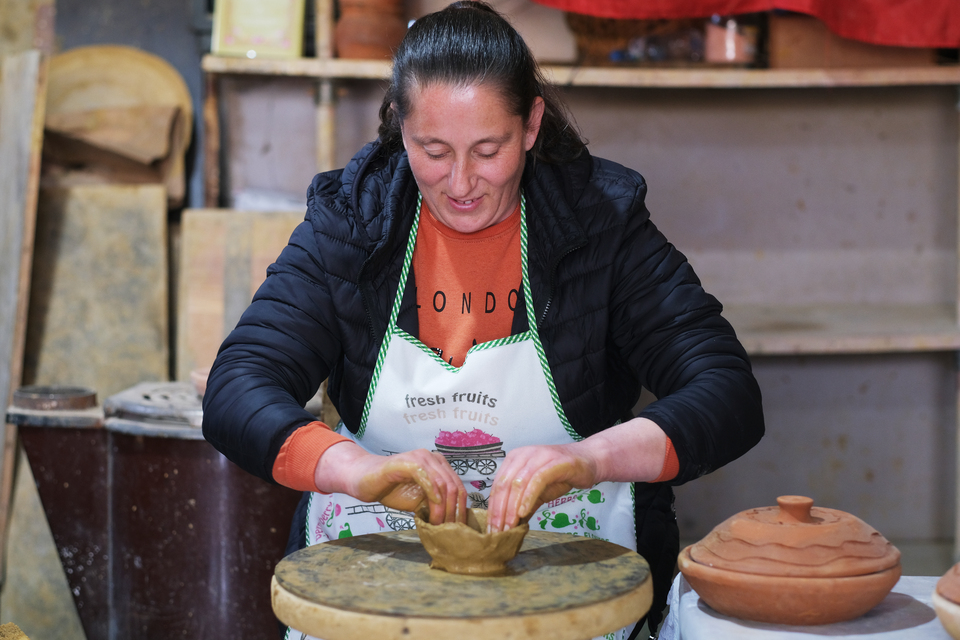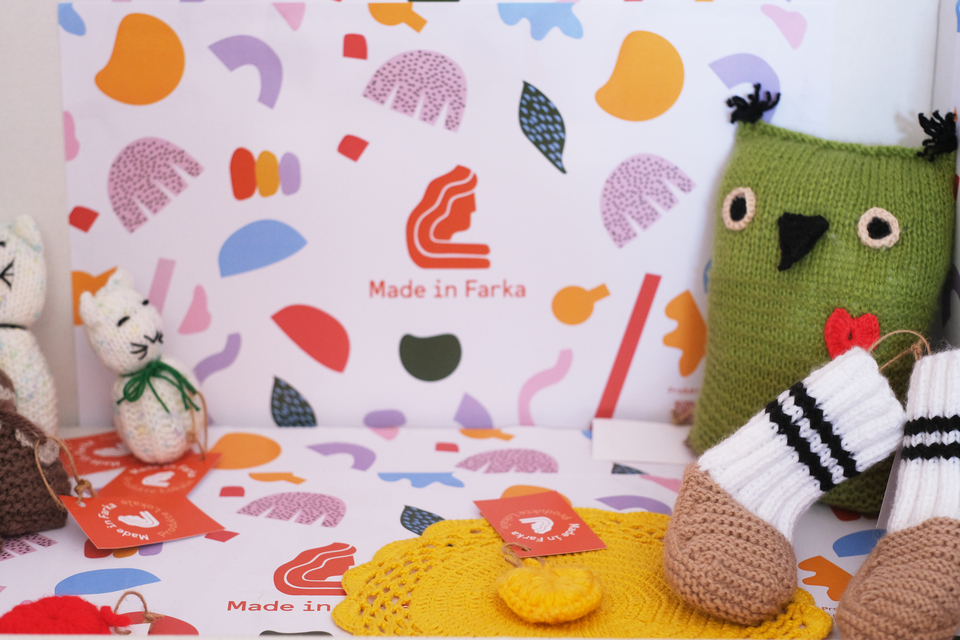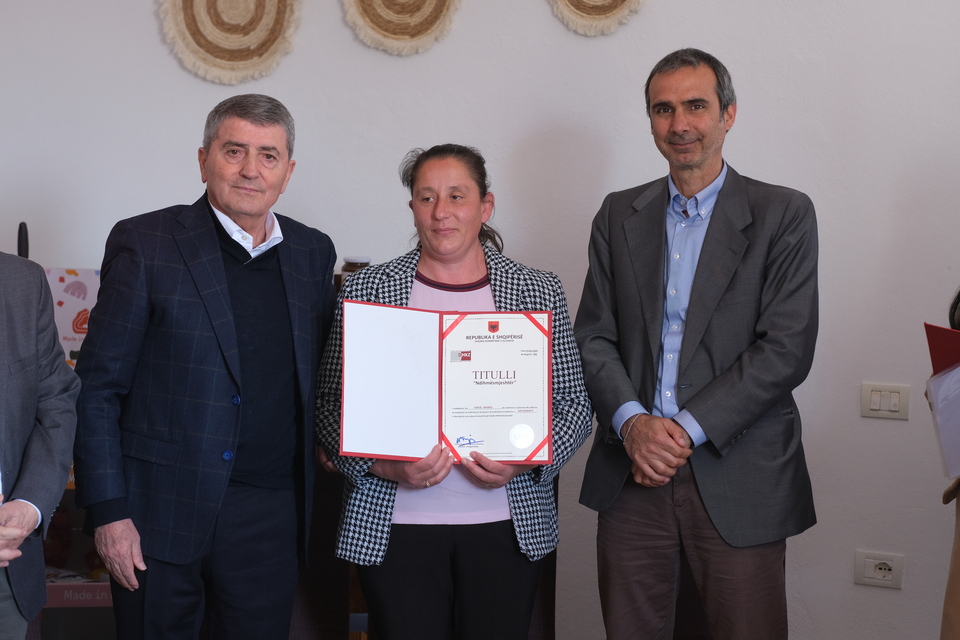From tradition to empowerment: women artisans learn new skills in the newly established artisan center in Tirana
Date:

Verie Tahiraj is a strong and determined woman, who has been supporting her family through economic hardship for years. When the opportunity to secure a source of income by becoming a part of the artisan value chain presented itself, she seized it without hesitation. Her eagerness to learn new skills and monetize her talents was fueled by a powerful desire to achieve her long-held dream: to work and to finally pay off her debts.
"I commuted for two hours a day and I never missed a single day of training during the three-month course," recalls Tahiraj, who resides in the outskirts of Tirana, the capital of Albania. She shares a home with her husband, two children, and her disabled in-laws, shouldering the responsibility of caring for her entire family. Tahiraj is a proud member of one of the groups that received technical training and support in producing pottery and other artisanal goods, thanks to an intervention by UN Women aiming at women’s economic empowerment of women, funded by the European Union. So far, 25 women from the Farka administrative unit, about 7 km from the capital, have strengthened their representation, expanded their knowledge through these learning and exchange opportunities, and have built their capacity in advocacy and facilitating dialogues between women artisans and businesses.
🆕Just promoted a new brand & artisan center: Made in Farka-specialized in handicraft products.
— UN Women Albania (@unwomenalbania) March 23, 2023
30 talented women in #Farka are now able to develop jointly new creative products for local & international markets, thanks to @EUinAlbania supported project#eu4localgenderequality pic.twitter.com/n3jMGCJzje
🌟Women artisans from #Farka displayed their new products in the winter fair. We are supporting them to expand product portfolio & met market demands through EU for Gender Equality in 🇦🇱 project, financed by @EUinAlbania
— UN Women Albania (@unwomenalbania) December 6, 2022
W/ Social Development Investment #eu4localgenderequality pic.twitter.com/e3xQ5MUXKQ
It is quite remarkable that these women have now managed to establish their first Artisan Center in Farka, a joint working space they manage and operate themselves and they have also launched a local brand, Authentic Farka, which they use to market all their handicrafts and other products crafted in accordance with the rich traditions of the area. The artisanal hub and the new brand were officially launched in March 2023, under the UN Joint Program "EU for Gender Equality in Albania", implemented by UN Women and UNFPA and funded by the European Union.
“Today, we have a new home of local artisanal products in the capital, filled with a vibrant and positive group of women brimming with energy and a strong desire to give their best," says Armida Alikaj from Social Development Investment (SDI) organization that implemented this UN Women initiative, primarily aimed at women with little or no income, in the course of one year.

The National Chamber of Crafts certified these women with the title of Assistant Masters. The head of the Chamber, Luan Bregasi, highlighted that even in the smallest of communities, women’s talent and passion can flourish and be passed down through generations.
For several months they were trained to develop their skills, to jointly improve production processes, and develop new creative products that meet local and international market demands. They have participated in fairs and concluded an outsourcing contract to produce artisanal products for a company in Ireland.
“The collaboration between local artisans and the international market is a new practice in Albania and we are proud to be the first to pioneer this model,” says Armida Alikaj, SDI Project Manager.

UN Women has been using a ‘gender-sensitive value chains and market development’ approach to reduce gender-specific barriers to women’s full economic participation and inclusion and promote equality between women and men. Thanks to "EU for Gender Equality in Albania" project, UN Women has established thriving value chains in four different locations across the country, including Farka, which is known for its century-long tradition in pottery. Today, women artisans in Farka are actively involved in the artisan value chain - Ceramics, Artisan Food Processing, and Artisan Wool.
“Most women artisans in the group are part of the value chain, but they remain largely invisible as they face challenges related to gender inequalities in business and balancing family responsibilities with their work," explains Ms Alikaj.
Verie Tahiraj is a prime example of these challenges, working from home to create embroidery and knitting products for sale to potential retailers, all while shouldering the significant burden of caring for disabled family members and managing family responsibilities.
“We firmly believe in the transformative power of women’s economic participation, and we remain committed to supporting initiatives that uplift and strengthen women artisans to achieve their full potential,” UN Women representative in Albania, Michele Ribotta highlighted.
But getting these women to work together and benefit from the project has been challenging.
"We made efforts to establish working spaces in two different locations to encourage broad participation from different villages," says Ms. Alikaj of SDI, recalling the door-to-door outreach efforts in six villages in the Farka administrative unit. However, women still face resistance and have to justify themselves every time they need their homes, due to deeply rooted patriarchal mentality.
Ms. Tahiraj, who led one of these spaces, shares that women have to close window shutters to avoid people gossiping and talking negatively about them and their gatherings. In her community, it is deemed unacceptable for a woman to work outside her house all day. Nevertheless, she remains determined and asserts her agency, saying, "I am used to this now and I can even say that I feel better. This new experience of working outside my home has been like therapy for me."